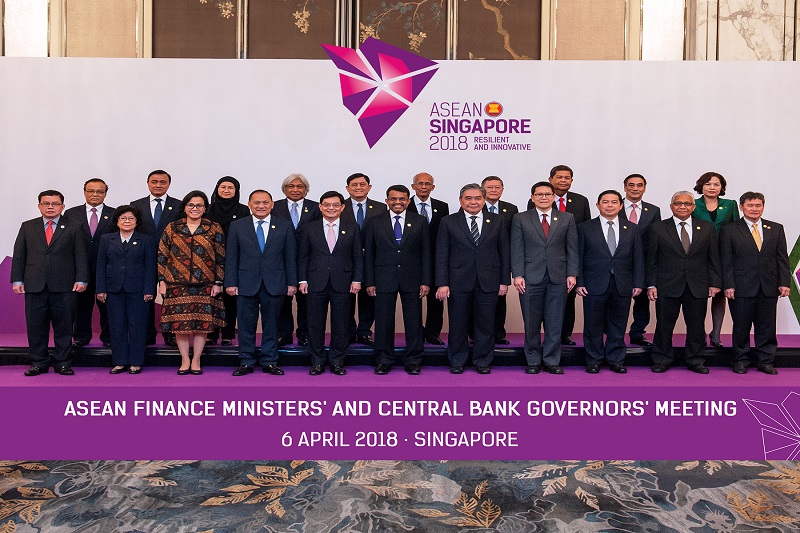
As announced by the Department
of Finance (DOF), the Philippines urges fellow members of the Association
of Southeast Asian Nations (ASEAN) to create a region-wide database on disaster
risk management.
The region-wide
database on disaster risk management among the ASEAN proposed by the
Philippines would allow the sharing of information on mitigating the effects of
climate change and guarantee timely assistance during calamities.
DOF Secretary
Carlos Dominguez III mentioned that the Philippines is spearheading the
proposal by communicating with the private sector to enable better coordination
in times of catastrophes and other crises even though there are “existing
capacity constraints”.
During a recent
joint meeting in Singapore, Sec Dominguez, his fellow finance ministers and the
central bank governors in the ASEAN stressed the significance of strengthening
their countries’ resilience in facing calamities.
The ASEAN
Finance Ministers and Central Bank Governors, in a joint statement after the 4th
ASEAN Finance Ministers’ and Central Bank Governors’ Meeting, said that the
resilience of its member-states “is important for sustaining growth as well as
protecting our people’s well-being.”
Moreover, “We
note the ongoing ASEAN Disaster Financing and Insurance (ADRFI) initiatives to
enhance the region’s capacity to adopt and implement ex-ante and ex-post
disaster risk management measures. Cambodia, Laos and Myanmar are working
together to launch the Southeast Asia Disaster Risk Insurance Facility
(SEADRIF) as a disaster risk management solution for the region.”
Sec Dominguez
said that an urgent need to implement disaster risk management measures to
protect the country’s vulnerable communities against climate change is brought
on by the irreversible damage caused by the inconsistent weather patterns.
“Within the
existing capacity constraints, we are building databases and constantly
improving on the quality and amount of data available to identify
vulnerabilities and manage risks,” Dominguez shared.
“This is a
continuing effort,” Dominguez noted. “Down the road, we are encouraging our
partners in the ASEAN to participate in building a region-wide database for
disaster risk management and possibly institutional structures that will enable
timely cooperation in the face of calamities.”
Other efforts
are being put up by the Philippines to counter natural disasters.
(1)
Digitise government assets and
infrastructure
(2)
Push legislation that will
institutionalise disaster risk financing strategies like reinsurance and
government-sponsored risk pools to assist communities in the event of
catastrophes.
The most
vulnerable local government units (LGU) in the country are now undertaking preliminary
studies for a parametric insurance scheme, he furthered.
Green Jobs Act
(Republic Act 10771), enacted 2 years ago, provides government incentives for
the creation of environment-friendly jobs, usually those that preserve the
quality of the environment, decarbonise the economy, protect ecosystems, reduce
pollution and restore biodiversity. These incentives include tax deductions and
the exemption of capital equipment from customs duties.
Sec Dominguez
was the former environment minister during the term of the late President Corazon
Aquino.
“Programs such
as this one support the general effort to encourage our enterprises to adopt
sustainable business practices. When they comply with benchmarks set for
sustainability, businesses qualify for insurable risks. Such incentives will go
a long way towards building a more environmentally sensitive national economy.”
he said.
He added, as
stated in the joint statement, the regional bloc has already initiated a
program to coordinate the sharing of disaster risk financing, with its first
phase completed in June 2017.
Funding support
for the region wide disaster risk insurance facility will come from the German
development institutions GIZ and KfW. This initiative is “a
pioneering ASEAN project that could be adopted in other parts of the world,”
Dominguez explained.
“The countries
of this region are stepping up to the challenges facing us today. The ASEAN
itself has become a mechanism for disaster risk mitigation on a broader level.
This is as it should be,” he noted.
“Typhoons, earthquakes and volcanic eruptions
take a toll on our communities and on our economy. We are spending billions of
pesos flood-proofing our most vulnerable areas in the face of more torrential
rains. Building for a sustainable and resilient development is more than just
an option for us. It is the only way to go,” he said.
















